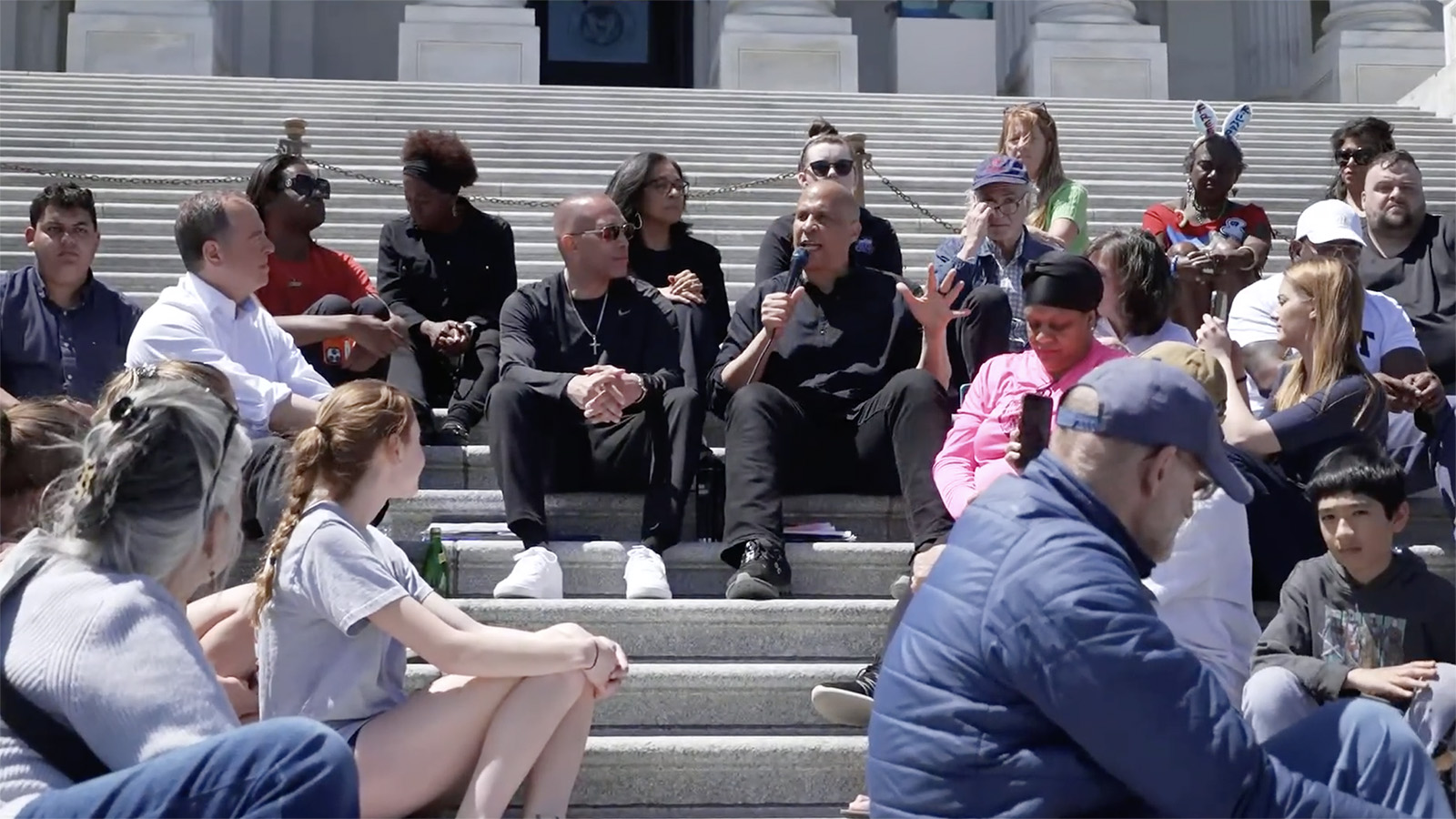
WASHINGTON (RNS) — As the sun rose over the U.S. Capitol on the last Sunday in April, House Minority Leader Hakeem Jeffries, wearing a gold cross necklace, sat next to Sen. Cory Booker on the building’s stone steps. The two looked around quietly for a moment, awaiting confirmation that the livestream of their “sit-in” — a daylong effort designed to push back against the Republican-led budget proposal and actions by President Donald Trump’s administration — had begun.
After someone off-camera informed them the broadcast was live, both men immediately bowed their heads in prayer.
“Father God, we humble ourselves before you and before all who may watch today,” said Booker, the New Jersey Democrat who attends a Baptist church in Newark. After asking the Almighty for strength, he prayed that his words might “be of service at this crisis moment in American history.”
It was a preview of the next 12 hours, as the two prominent Democratic lawmakers and a slew of guests outlined a decidedly faith-forward argument against Republican leaders and the Trump administration. The pair discussed their own religious backgrounds, referred to liberation theology, read from the Bible and lauded what Booker called the transformative power of “faith traditions” — a phrase that came up no fewer than 45 times during the broadcast.
When the two weren’t talking, they passed a microphone to fellow lawmakers such as Georgia Sen. Raphael Warnock, who is also a pastor, and to various faith leaders, including activist and Yale Divinity School professor the Rev. William Barber II.
“If you pray at the opening session of the Senate or the House but then after you pray — P-R-A-Y — you pass a budget that preys — P-R-E-Y-S — on people that are vulnerable, then you just canceled out your P-R-A-Y,” Barber told the crowd as he stood next to Booker and Jeffries.
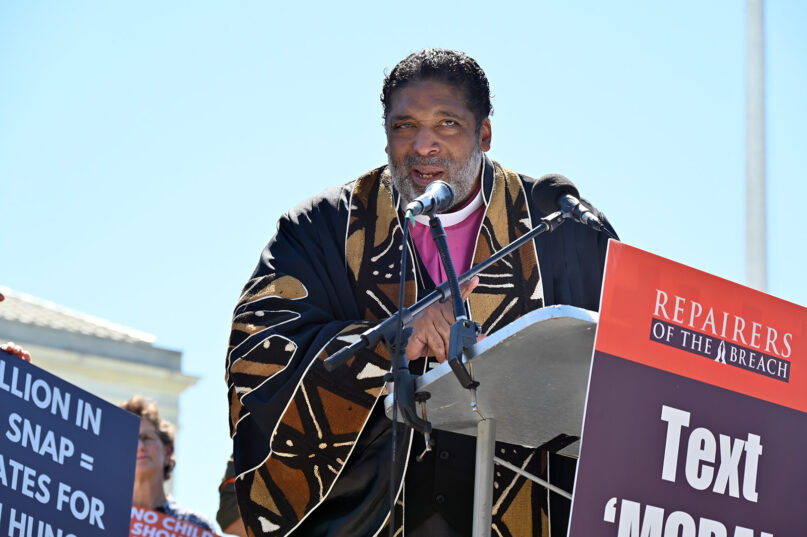
The Rev. William Barber II speaks at a Moral Monday rally near the U.S. Capitol, April 28, 2025, in Washington. (RNS photo/Jack Jenkins)
The sit-in, with its faith-filled language and its clergy participants, was part of an apparent strategic pivot by Democratic leaders desperate to find a foothold in a country where Republicans and conservatives dominate all three branches of government. As frustrated liberals pressure party leaders to counter the Trump administration, Democrats are taking some cues from the work of progressive religious activists — particularly Barber and his allies — who have been some of Trump’s loudest critics since his first administration.
“While many progressives, liberals and Democrats have been struggling to try and catch up to what the Trump administration is doing, people like William Barber and other folks on the religious left have had a kind of moral clarity about what’s going on for a long time,” Ruth Braunstein, a sociology professor at the University of Connecticut and director of the school’s Meanings of Democracy Lab, said in an interview. “So I think they’ve been able to respond more quickly.”
Faith-based pushback to Trump’s second presidency began the same day he was sworn in, when Barber preached a sermon challenging Trump’s incoming administration and issued a challenge to like-minded faithful, saying, “In this moment, we must remember whose we are and who we are.”
The next day, Trump sat for a sermon at the Washington National Cathedral, where the Rt. Rev. Mariann Budde, the Episcopal bishop of Washington, made headlines for asking the president to “have mercy” on transgender people, immigrants and refugees. A few days after that, a group of Quakers filed a lawsuit over the Trump administration’s decision to reduce restrictions on immigration enforcement raids at churches, the first in what would eventually become six faith-led lawsuits — including one led by the U.S. Conference of Catholic Bishops — that list dozens of religious organizations and even entire denominations as plaintiffs. Meanwhile, Jewish, Muslim and Christian organizations — including some evangelicals — have issued statements, staged vigils and participated in protests against the administration, especially its immigration and deportation policies.
The day after the sit-in, on April 28, Barber launched a series of weekly “Moral Monday” demonstrations on Capitol Hill that began with the pastor being arrested alongside two others while praying in the Capitol Rotunda against the GOP-led budget. A week later, five faith leaders allied with Barber were arrested in the Rotunda while doing the same.
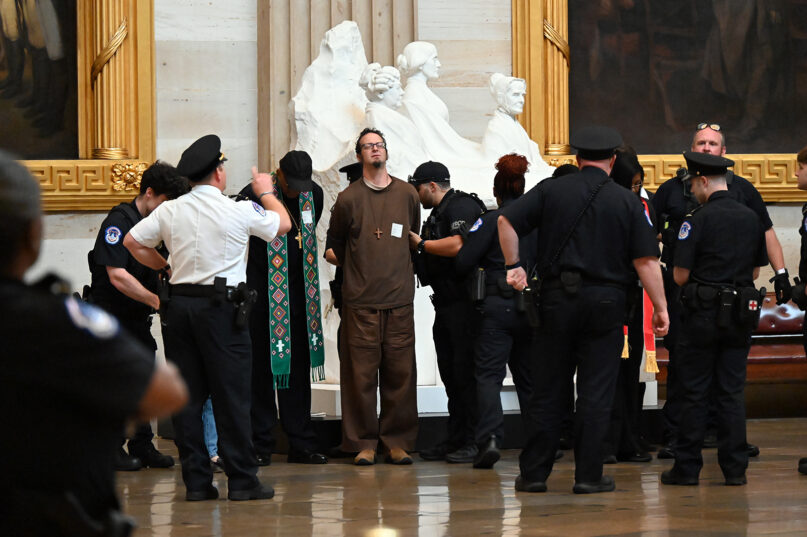
Capitol police arrest Shane Claiborne, center, and others after they prayed in the U.S. Capitol Rotunda, May 5, 2025, in Washington. (RNS photo/Jack Jenkins)
“Let truth trouble the chambers of the Capitol,” Shane Claiborne, a longtime Christian activist, said in a prayer shortly before he was arrested in the Rotunda on Monday (May 5). “Let there be no peace where there is no justice. Let there be no comfort for those who legislate cruelty.”
Sen. Chris Coons of Delaware — a Democrat and Presbyterian who graduated from Yale Divinity School — was one of several Democrats who publicly celebrated the activism.
“Faith leaders have been at the forefront of every progressive movement in our nation’s history – from abolition to labor rights to civil rights and on – so I’m glad to see faith leaders speaking out and getting into good trouble in opposition to the upcoming reconciliation bill,” Coons told RNS in a statement, referring to Barber’s arrest.
Coons added that “there are over 2,000 references to caring for the poor in Scripture” — a topic he discussed with Booker when the New Jersey senator took questions during his 25-hour speech in late March — and said he doesn’t “believe passing a bill that takes away health care from our most vulnerable in order to pay for new tax breaks for the wealthiest Americans aligns with Jesus’ teachings.”
Braunstein said Democrats’ pivot to faith doubles as a rejection of the idea that the Republican Party is the truly religious party — and an acknowledgment of the powerful role faith continues to play in American politics.
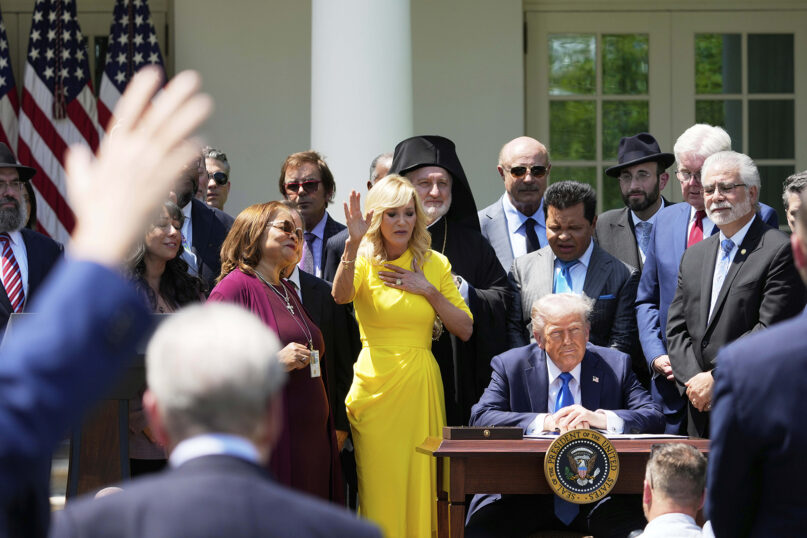
President Donald Trump and other religious leaders listen to a musical performance before Trump signs an executive order during a National Day of Prayer event in the Rose Garden of the White House, May 1, 2025, in Washington. (AP Photo/Alex Brandon)
“I think what we’re seeing is a very clear strategy by some prominent Democrats to be louder about the role of their faith.”
Also important, she said, is how many of the loudest voices among lawmakers and faith leaders are people of color.
“As much as we talk about white evangelicals as being this stalwart bloc of Republicans, the most consistent and loyal partisans in this country are Black Christians, and they consistently vote Democratic,” she said.
For his part, Booker repeatedly appealed to faith during that marathon speech — which attracted widespread attention and became a source of inspiration for some liberals — before winding down with several phrases long used in progressive religious circles.
“This is a moral moment. It’s not left or right; it’s right or wrong,” Booker said, before concluding with a line made famous by the late Georgia congressman and civil rights icon John Lewis: “Let’s get in good trouble.”
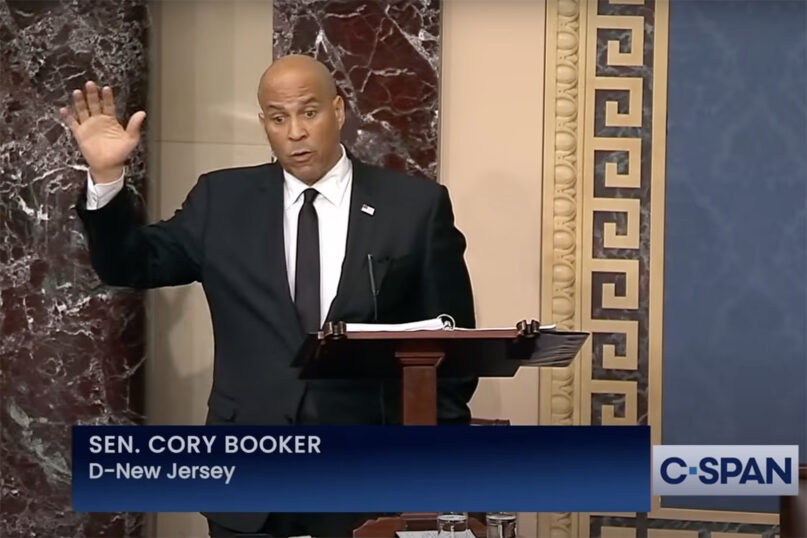
New Jersey Sen. Cory Booker addresses the U.S. Senate, March 31, 2025, at the start of a 25-hour speech at the Capitol. (Video screen grab)
“He quoted from our movement,” Barber said of Booker, who has previously participated in some of Barber’s demonstrations.
Asked about lawmakers’ endorsement of his activism, Barber said he hoped lawmakers would “invite” religious leaders in — as well as people who might be negatively impacted by the budget proposals.
Lawmakers have, in fact, invited religious activists into the Capitol, but the fledgling alliance appears to be a delicate balance, with figures on both sides steering clear of explicit coordination. Barber has long refused to allow lawmakers to speak at his protests, and he told RNS he was unaware Jeffries and Booker were planning their sit-in until he received a call about the event the night before. Barber also said that before his arrest at the U.S. Capitol, he was escorted into the building by staff members from the office of Rep. Jamie Raskin — a lawmaker who has attended some events led by Barber — but stressed the aides were not aware of the pastor’s protest plans.
Similarly, a spokesperson for Raskin said only that the office “helps thousands of people access the Capitol complex each year, including faith leaders like Reverend Barber.”
Jeffries was also reticent when asked at a press conference about Barber’s arrest. While he didn’t overtly endorse Barber’s actions, he also didn’t condemn them.
“We’re in a ‘more is more’ environment, and Rev. Barber spoke powerfully at the sit-in yesterday,” Jeffries said.
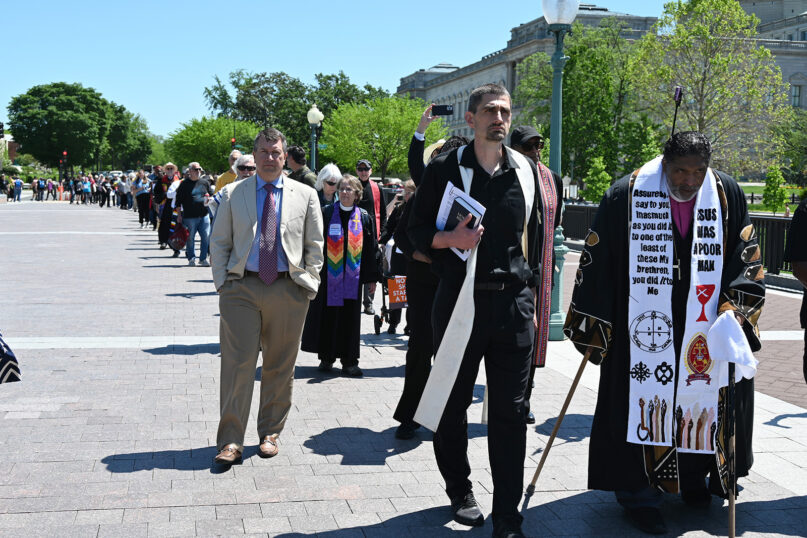
The Rev. William Barber II, front right, and the Rev. Jonathan Wilson-Hartgrove lead a procession from a Moral Monday rally to the U.S. Capitol, April 28, 2025, in Washington. (RNS photo/Jack Jenkins)
Other lawmakers have long-standing relationships with activists. Barber said that when Rep. Al Green of Texas — the lawmaker who stood up alone to protest Trump’s joint address to Congress in March, shouting “you don’t have a mandate to cut Medicaid” — learned about the pastor’s Moral Monday effort, the congressman called him and offered to help any way he could, floating the possibility of celebrating their efforts from the floor of the House. The two have known each other for years, Barber said, with Green attending Barber’s sermons and participating in past demonstrations.
In a statement to RNS, Green said he is “in support of Rev. Barber’s activism and driven by it,” and confirmed his Christian faith played a role in his own protest during Trump’s speech. He cited Matthew 25 as inspiration, referring to the passage as his “North Star” when it comes to issues involving food, clothing, shelter and health care.
But for Barber and his allies, whether Democrats endorse their activism is largely beside the point.
“I don’t know if it’s about who’s turning to who, but what we have to understand about MAGA — we cannot mobilize the American people just on a partisan basis,” he said. “We’re past that. This has to be an issue of morality versus immorality, right versus wrong.”
